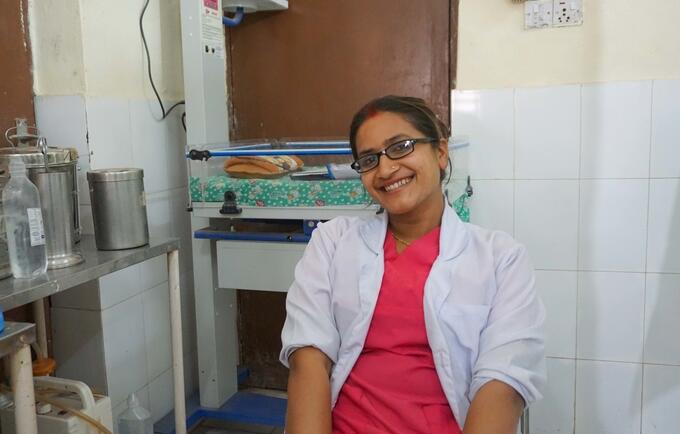This year’s International Day of the Midwife comes at an especially poignant time as the COVID-19 pandemic rages on. As the lessons of COVID-19 are teaching us, we need greater investments in midwifery under universal health coverage.
Although there has been great improvement in recent years, Nepal continues to have one of the highest maternal death rates in the Asia-Pacific region, with 239 women dying per 100,000 live births. Many parts of rural Nepal lack accessible health facilities or trained birth attendants. Nationally, 41 per cent of babies are still delivered at home, and only 58 per cent of births are assisted by a skilled health-care provider.
UNFPA has been advocating for skilled care at every birth by an accredited health professional, such as a midwife, doctor or nurse who has been trained to manage uncomplicated pregnancies, deliveries and the immediate post-natal period. Skilled birth attendants also need to be able to identify complications and obtain timely emergency assistance. Midwives provide all these services, and more.
Sakila Chaulagian is among the first batch of midwives who recently completed the three-year midwifery course run by the National Academy of Medical Sciences – part of the first midwifery bachelor’s degree programme ever offered in Nepal. Chaulagain (24) spoke to UNFPA Nepal.
Q: How did you decide to become a midwife?
I was around seven years old when my mother was pregnant. One day she was in labour, marked by painful contractions. Unfortunately, there was nobody to help her. After three days of labour pain and her lonely struggle, she delivered her fourth baby at home. Thank God nothing happened to her and the baby. Not only villagers offered her no help, they also gave her a scornful look for delivering the fourth daughter. Worst, as the placenta did not come out soon after the delivery, my mother was forced to hang a broom around it. When I grew up and heard my mother’s full story about her difficult childbirth experience, I decided to become a someone who can provide care to pregnant women.
After completing my school, I joined the Proficiency Certificate Level (PCL) in Nursing. This course made me feel that I was inching closer to my dreams. Upon completing PCL nursing, I joined the government service and was deployed to a remote area in Baitadi district. The situation there was quite distressing -- a high rate of teenage pregnancy and lack of quality maternal health services to name a few. I met a woman who had 12 children. There I saw first-hand how women and girls were suffering from the chaupaddi practice. During the time of menstruation or after childbirths, women were not allowed to stay at home. They were forced to live in secluded huts. This kind of practice really hurt me and at the same time motivated me to work more for women who are facing barriers to receiving quality maternity care.
Furthermore, health facilities in rural areas are not well-equipped and the quality of services they provide is still an issue, making the critical task of saving lives of mothers and babies more difficult. Pregnant women often have to walk hours to reach the nearest health facility. Worse, some of them die on the way for want of timely treatment and care. After hearing those stories, I thought I must do whatever I can to save the lives of mothers and babies.
Q: After this midwifery course, are you willing to work in rural parts of the country?
A: Of course. I am very eager to go to rural areas and help save lives of mothers and babies. I am from a remote part of the country. When a woman was giving birth in Baitadi, no one touched her because the villagers thought they will be cursed by their god. So she had to go through the whole process by herself. Even when there was severe bleeding and she shouted for help, nobody was willing to help her. There are many women who have faced a similar situation. All these sad cases make me more committed to work for women.
Q: What do you expect of your future career as a midwife?
A: Contributing to reduction of maternal mortality is my ultimate career goal. I also think that the government should do more to promote the midwife cadre and create positions for midwives.
===================
UNFPA, the UN's sexual and reproductive health agency, works in Nepal and over 150 other countries globally to achieve zero maternal deaths, zero unmet need for family planning, and zero gender-based violence and other harmful practices against women and girls - a vision enshrined in the Programme of Action stemming from the landmark 1994 International Conference on Population and Development (ICPD).
To support our lifesaving work amid the COVID-19 pandemic, including safeguarding pregnant women and new mothers, as well as the midwives who support them, visit https://donate.unfpa.org/th-en/covid-19


